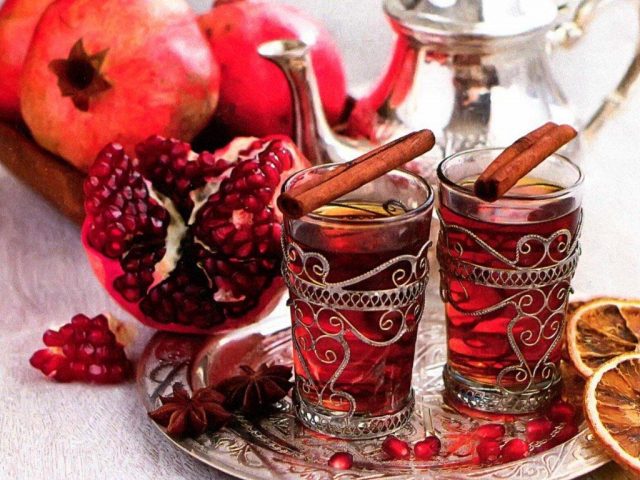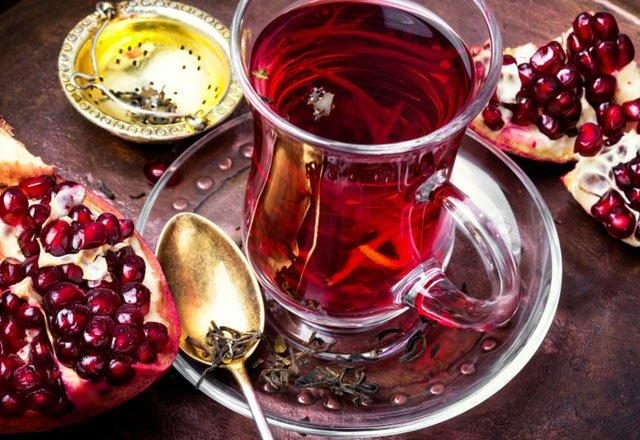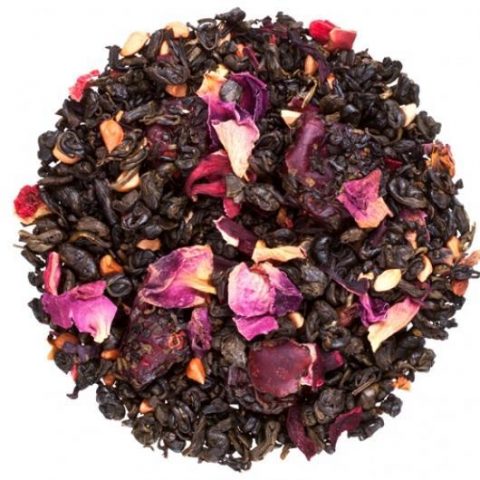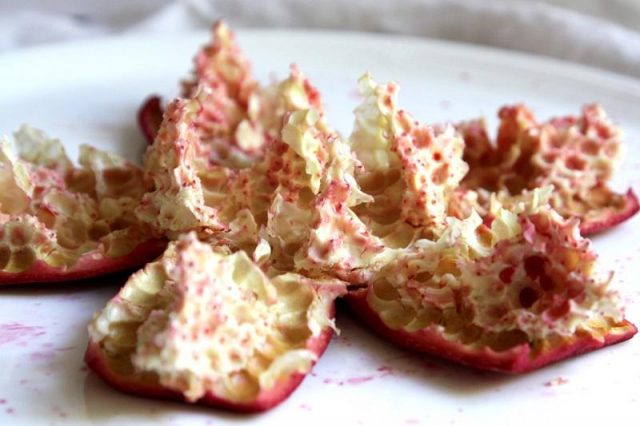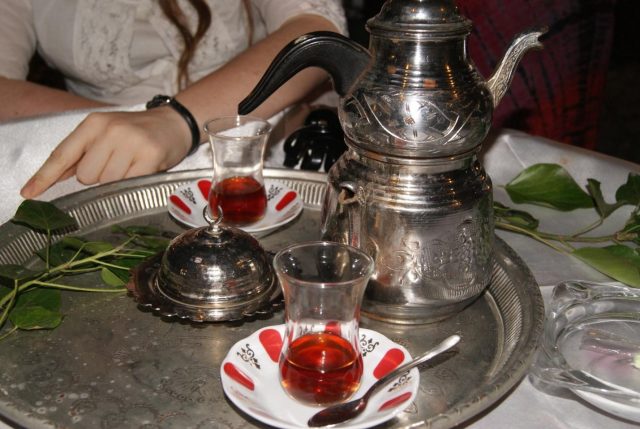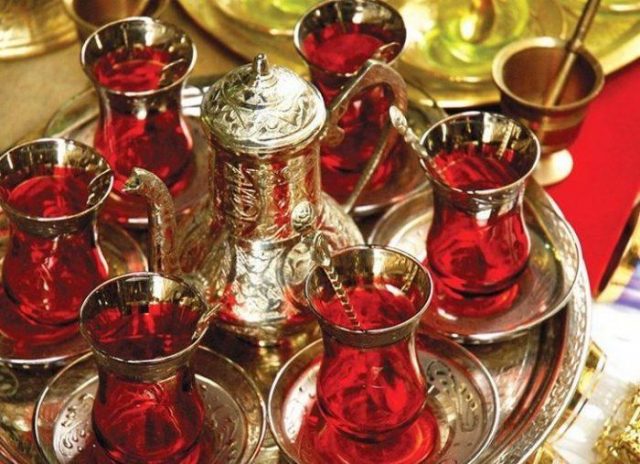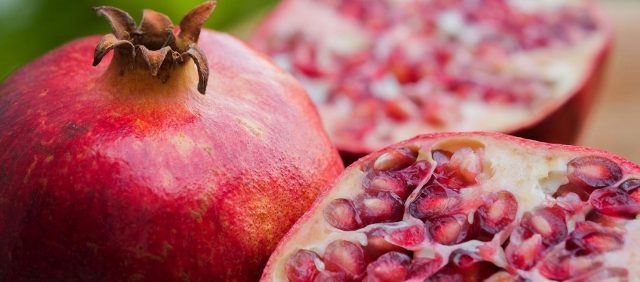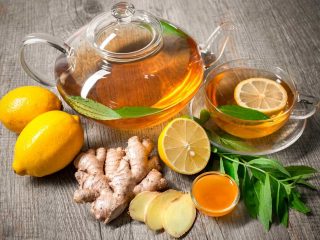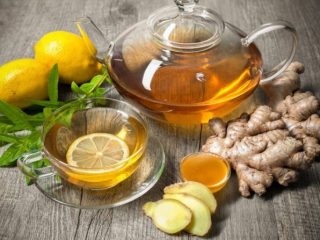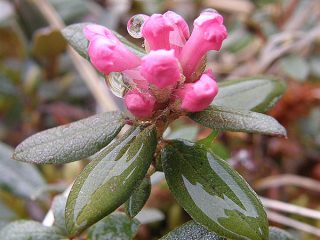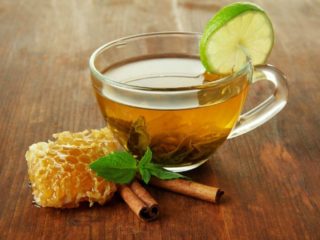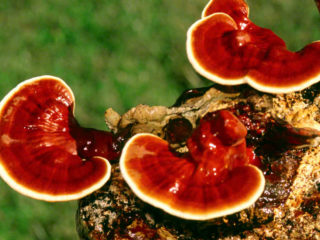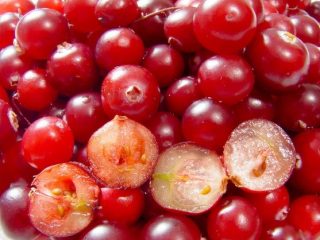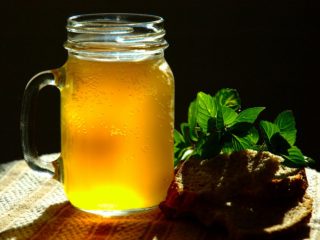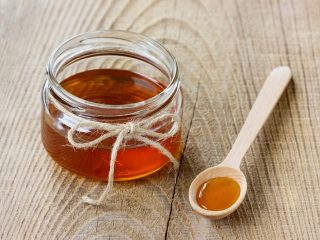Content
- 1 What does pomegranate tea look like?
- 2 Can I drink pomegranate tea?
- 3 What is pomegranate tea made from?
- 4 What are the benefits of pomegranate tea?
- 5 How to brew pomegranate tea from Turkey
- 6 How to drink pomegranate tea
- 7 Does pomegranate tea raise or lower blood pressure?
- 8 Pomegranate tea during pregnancy
- 9 Contraindications to pomegranate tea
- 10 Conclusion
- 11 Reviews of pomegranate tea from Turkey
Tourists who often visit Turkey are familiar with the peculiarities of the local tea tradition. This ritual is not only a symbol of hospitality, but also a way to try a delicious, unique pomegranate drink. The benefits and harms of pomegranate tea from Turkey depend on the methods of its preparation and the degree of strength.
What does pomegranate tea look like?
Pomegranate tea appeared in Turkey after the First World War. Before this, Turkish coffee was most common in the country. The devastation of war had made coffee beans almost as valuable as gold, so Turkish producers turned their attention to vast tea plantations - and they were right. Pomegranates grew everywhere in Turkey, so making pomegranate-based tea became quite obvious.
Pomegranate tea from Turkey over time became the calling card of the country.It began to be produced on an industrial scale, including for sale in other countries. To do this, they use a special system for cleaning and preparing raw materials, resulting in a healthy powder with a memorable aroma. Many people confuse pomegranate tea with hibiscus tea, but these are completely different drinks. Despite the fact that hibiscus acquires a reddish tint when brewed, its taste and aroma are completely different from pomegranate tea. Hibiscus is produced from the petals of the Sudanese rose, or hibiscus.
Classic tea prepared by hospitable Turkish housewives looks special. Its appearance evokes associations with warm summer evenings near fragrant gardens. Pomegranate tea from Turkey can be easily recognized by its description:
- color: depending on which parts of the pomegranate the tea is made from, the shade varies from pale red to deep burgundy;
- aroma: when brewing, a recognizable smell of pomegranate appears;
- taste: without special additives, the drink has a characteristic sourness.
Can I drink pomegranate tea?
Pomegranate is one of the oldest fruits. The Greeks called it “grainy apple” and used it as a useful remedy to help with a variety of diseases. Based on it, they learned to make juice, which today is considered one of the most valuable drinks in terms of composition.
Tea in Turkey is prepared with the addition of juice, pulp or grains, as well as parts of the tree. The properties of healthy drinks prepared according to different recipes have many similarities and several differences.
Pomegranate tea is drunk everywhere in Turkey: special tea houses have been created for men in the country, and for women there are separate organizations - tea gardens.Over a cup of tea they discuss politics, sports, news and gossip. To conduct a tea ceremony in Turkey, they hire specially trained people - chajjis, who brew Turkish pomegranate tea according to the rules, with strict adherence to proportions. Tea can be consumed by everyone, the drink can be made very strong or diluted with water and this pomegranate tea can be given even to a small child.
What is pomegranate tea made from?
Pomegranate tea in Turkey is traditionally prepared according to special recipes. For Europeans, the differences in preparation are not always clear; the local population claims that the use of different parts of the pomegranate tree makes the drinks taste great.
Industrial production has simplified the principles of preparation, offering the consumer a healthy powder prepared in a special way. Making your own tea involves choosing one part of the tree or fruit.
Pomegranate flower tea
The classic flower brew recipe involves using dried petals and leaves. They are collected during the flowering period, then dried until slightly crunchy. Raw materials are stored using fabric bags, where sunlight and moisture do not penetrate.
For 1 cup of tea take 1 tbsp. l. dried petals and leaves. The raw materials are poured with boiling water and left for 10-15 minutes. under the saucer. When serving, the drink is filtered and a sweetener is added. Pomegranate flower tea with honey is considered especially tasty.
Pomegranate peel tea
Pomegranate peel contains an increased amount of useful elements.
The white membranes that cover the grains and protect them from damage are rich in flavonoids, but can make the drink bitter when brewed. When harvesting, part of the white peel is removed, and a small amount is left to increase the nutritional value.
The drink is prepared from preserved raw materials or using fresh peels:
- First way: The peels are dried, divided into small pieces, then ground to a powder. When brewing, take 1 tbsp. l. for 250 ml of water;
- Second way: infusion of fresh peels. They are cut into small pieces, then poured with boiling water and infused.
The benefits of tea made from pomegranate peels can only be discussed if it is used freshly brewed; if the drink has settled, it can be a source of harm to health.
Pomegranate leaf tea
A healthy drink from the leaves is usually made on a powder basis, which is stored for several years. It’s easy to brew it yourself and drink it hot or cold.
What are the benefits of pomegranate tea?
Turkish pomegranate tea can not only quench your thirst or please your taste buds, its composition has beneficial properties:
- relieve stress, calm the nervous system thanks to the content of essential oils;
- amino acids, vitamins and essential oils help normalize blood pressure, have a positive effect on the condition of blood vessels, prevent the formation of atherosclerotic plaques, and normalize blood flow processes;
- flavonoids help eliminate the symptoms of inflammatory and infectious diseases; in combination with tannins and vitamins, they strengthen the immune system and increase the body’s resistance to external influences;
- the vitamin composition, supplemented with tannins, has a positive effect on the activity of the thyroid gland;
- with the participation of the components of the composition, chemical reactions for protein synthesis take place in the body, the degree of digestibility of products increases, and metabolic processes improve;
- ascorbic and pantothenic acid help stabilize the body during a cold, vitamins replenish the loss of elements, and the liquid prevents water imbalance.
Pomegranate tea is often recommended for anemia; it helps replenish iron deficiency and normalize the natural balance of micro- and macroelements.
How to brew pomegranate tea from Turkey
The local population of Turkey follows the tradition of brewing pomegranate tea. The country's tea establishments are proud of the way their service is organized. For classic cooking, special dishes made from a variety of materials are used. Teapots consist of two parts of almost the same size, placed on top of each other. The upper teapot is filled with tea leaves and water, and the lower one is filled with boiling water: it functions as a “water bath” for proper infusion.
Cold water is used to brew the powder. It saturates the tea with additional oxygen, according to the local population. Then boil the water with tea leaves over medium heat for 5 - 6 minutes. The drink is poured into the upper container and placed on the lower one to infuse for 10-15 minutes.
Pomegranate tea is poured into glasses and served with fruits, sweets, salty cookies, sugar or honey. Drinking tea is a separate meal. It is never served after a meal or before a meal. Strong tea is preferred by the male population; for women and children, the drink is diluted with water and various sweeteners are added.
How to drink pomegranate tea
Classic recipes for pomegranate tea from Turkey have been supplemented or modified over time. You can add honey to warm pomegranate tea and drink it chilled. Powdered rinds, grains, or leaves are traditionally added to brewed black or green tea.
Lately, pomegranate tea with the addition of lemon juice or crushed ginger root has become especially popular, although such additives are not accepted in Turkey.
A concentrated strong drink from Turkey is drunk 200 ml daily. When chronic diseases worsen, take a break or dilute the tea with water.
Tea infused with pomegranate petals and leaves is consumed 1 - 2 cups daily.
Does pomegranate tea raise or lower blood pressure?
Pomegranate is known as a fruit that helps normalize blood pressure. Pomegranate tea from Turkey, at medium concentration and moderate intake, lowers and normalizes blood pressure. It is drunk warm or chilled with added sugar to taste.
The mechanism of lowering blood pressure becomes possible due to the effect of the drink on the elasticity of blood vessels, preventing the formation of blood stagnation and stabilizing blood flow.
Pomegranate tea during pregnancy
The content of iron and B vitamins indicates the benefits of pomegranate tea from Turkey during pregnancy, but there are a number of restrictions that a woman should take into account in order not to harm her health.
- Iron and folic acid are especially necessary for a pregnant woman during the first trimester. By the third trimester, the body’s ability to respond to plant components increases, so you should be careful with the drink;
- Pomegranate tea, infused with leaves, flowers or grains, differs in the concentration of main substances from tea with the addition of juice or peels, therefore, during pregnancy, preference is given to the first option;
- If the expectant mother has increased stomach acidity or has concomitant intestinal problems, then it is better to stop drinking the drink completely.
Contraindications to pomegranate tea
In addition to its beneficial properties, pomegranate tea from Turkey can provoke unwanted reactions in the body. It is contraindicated:
- people suffering from chronic diseases of the stomach, intestines or pancreas;
- those who suffer from increased sensitivity of the gums (the acid content can provoke an aggravation and lead to increased tooth sensitivity);
- those who have allergic reactions to pomegranate;
- children under 3 years of age: upon reaching this age, the drink is administered gradually in small portions.
In addition, if pomegranate tea is taken frequently, an overdose may occur. Its symptoms appear as there is an excess of concentrated substances:
- weakness, lethargy;
- drowsiness;
- increased sweating;
- nausea;
- vomit;
- slight dizziness.
These symptoms also indicate that not only oversaturation has occurred, but also a drop in pressure due to uncontrolled consumption of the drink.
Conclusion
The benefits and harms of pomegranate tea from Turkey depend on how and what the drink is made from. For people with low blood pressure, it can cause deterioration in well-being. Those who are not susceptible to pressure changes will find tea from Turkey divinely beneficial, capable of invigorating and energizing them.
Reviews of pomegranate tea from Turkey

